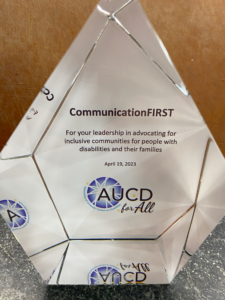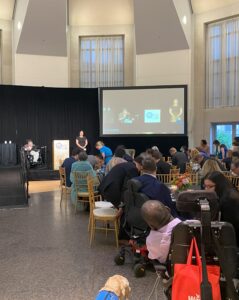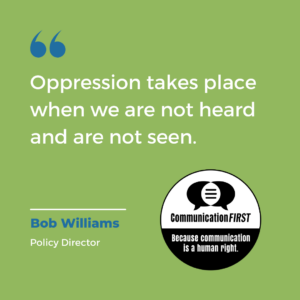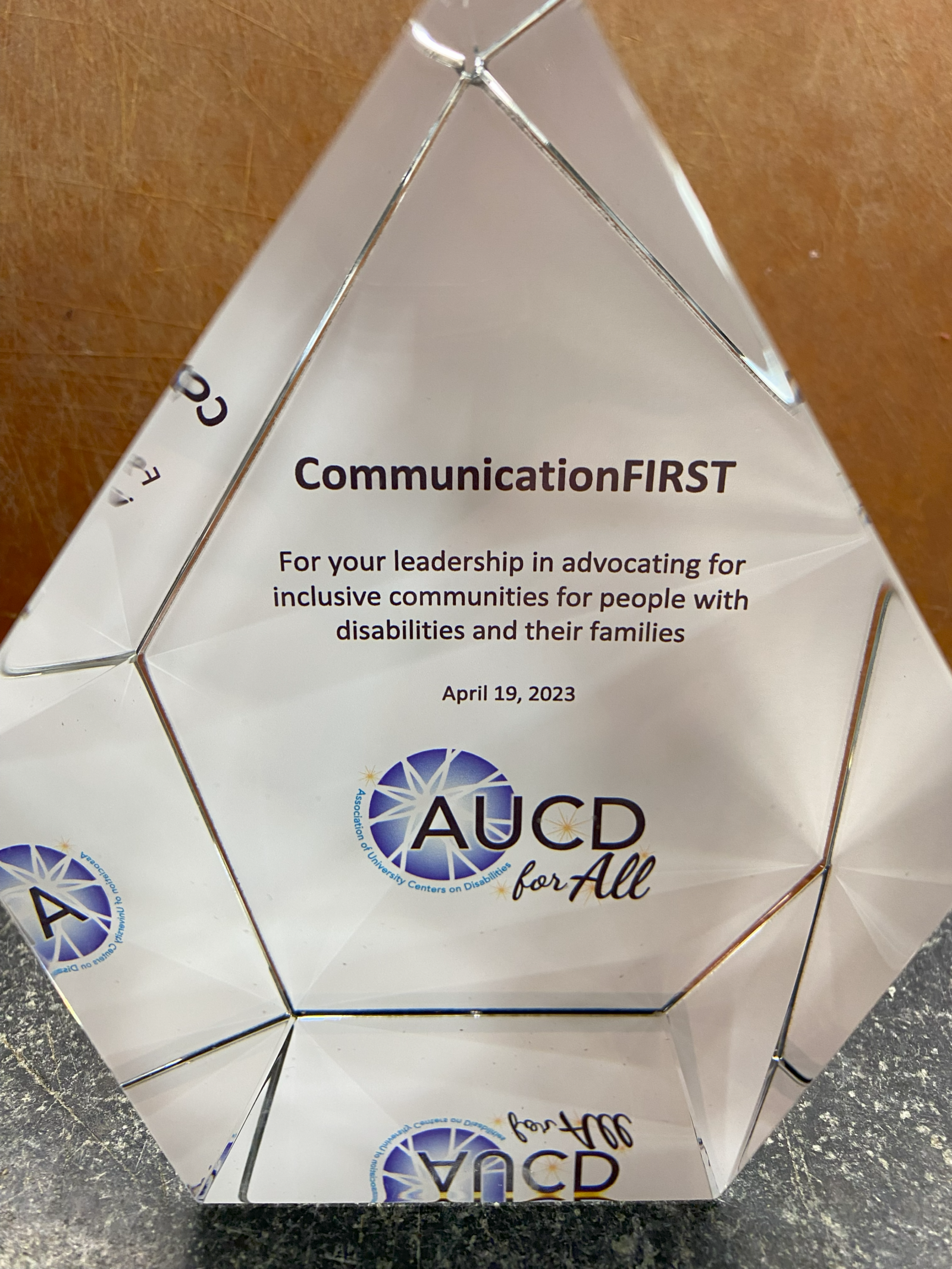On April 19, 2023, CommunicationFIRST was honored to be given an award from the Association of University Centers on Disabilities (AUCD) for “leadership in advocating for inclusive communities for people with disabilities and their families.”
CommunicationFIRST’s co-founder and Policy Director Bob Williams delivered the acceptance speech on behalf of the organization. The text of his remarks, which received two standing ovations, is pasted below, and can be accessed here. You can listen to the remarks by clicking here or on the media player below.
AUCD’s Dawn Rudolph introduced Bob Williams and CommunicationFIRST. And long-time friend of both Bob Williams and CommunicationFIRST, Tawara Goode, past AUCD Board Chair, emotionally congratulated Bob and CommunicationFIRST.

Award Acceptance Speech
Delivered by CommunicationFIRST Co-Founder
and Policy Director Bob Williams
April 19, 2023
Good evening, and thank you very much. Tauna Szymanski, our Executive Director and Legal Director, is also here with us.
It is good to see a blend of new as well as familiar faces here. Don’t worry. I will not single out who is who except, of course, for Tawara Goode, who I have known, worked with, and most importantly, learned from, the longest of just about anyone. And we are still working together. Early in our careers, we worked from different vantage points to help about 120 teenagers and adults with significant disabilities and medical complexities to, first of all, leave their cage-like cribs, which they spent virtually their entire lives in, to develop the tolerance to use a wheelchair and eventually leave Forest Haven and move into the community.
It was there that I first glimpsed the true charge and power of what were then known as the University Affiliated Programs to liberate people by dismantling and moving beyond the so-called barriers to inclusion. And I believe this is true of the DD Network as a whole, as well as all University Centers that make up AUCD.
 So, I want you to know how much CommunicationFIRST as an organization, and I personally, are grateful and honored to receive this award for leadership in fostering and strengthening inclusive communities for all.
So, I want you to know how much CommunicationFIRST as an organization, and I personally, are grateful and honored to receive this award for leadership in fostering and strengthening inclusive communities for all.
We feel particularly honored to receive it along with Dr. Iheoma U. Iruka. Her work, centered on ensuring excellence for young diverse learners, especially Black children and their families, through the intersecting lens and perspectives of anti-bias, anti-racist, culturally grounded community action, research, program, and policy, is not merely long overdue. It is urgent and imperative work that must be done now — especially now, during these divisive times.
We must be challenged by it, learn from it, and partner with the Equity Research Action Coalition and other community organizations to engage in equity-driven research, and to translate and leverage such research findings in ways that create, nurture, and strengthen equity-driven public policy, practices, and programs, as well as the opportunities and results they can bring about for children, adults, and families, and for neighborhoods, communities, nations, and the world.
As all of us in this room and those we work with know, now is definitely not the time to go silent, or to somehow pretend that systemic racism and other, often co-occurring forms of oppression, like ableism, sexism, LGBTQ+-phobia, speechism, and the rest are just something “those people should get over.” We must give lie to such rank prejudice and the status quo of antiquated dogma, public policy, and stereotypic assumptions by replacing them with inclusive knowledge, leadership, and solutions.
This July 26th will mark two events.
The most consequential of these is it will mark the 33rd anniversary of the ADA [Americans with Disabilities Act].
It will also mark the 30th anniversary of the day that then-HHS [Health and Human Services] Secretary Donna Shalala appointed me to be the Commissioner of what was then the Administration on Developmental Disabilities, and to administer the nationwide network of Developmental Disabilities Councils, Protection and Advocacy Systems, and the UCEDDs [University Centers on Excellence in Developmental Disabilities]. It was the best job I have ever had. Because what the DD Network is about is reimagining and enabling people to not merely to “live in the community,” but to live in community, in full communion and communication with each other, as equals.
Our task at CommunicationFIRST is the same. 
Oppression takes place when we are not heard and are not seen. It occurs when we do not see ourselves or each other as equal and whole. When we do not believe we can act as individuals or as a community to uproot the pervasive injustice we experience.
Unfortunately, this also describes the lifelong dilemma of far too many children, working-age persons, and older adults, who require typically multiple forms of augmentative and alternative communication (AAC) tools and support to express themselves, to be heard, and to get on with life — and are wrongly denied it based on unwarranted assumptions and biases grounded in the notion that those of us with little to no understandable speech are unintelligible, lack language, have little to say, do, or, contribute. And no need nor real right to do so.
Some things have, of course, improved for people who need AAC in your and my lifetimes. But only for some individuals, in some states, in some situations, and only some of the time.
We know, though, that many if not most are denied it, and, consequently, denied every equal opportunity, every equal right the Civil Rights Act of 1964, Section 504, IDEA [Individuals with Disabilities Education Act], and the ADA should afford.
We do our work as a civil rights and disability justice organization. Not because it is a silver bullet. We recognize much more than this must be done. But until we make progress on the civil rights front, people with little to no understandable speech who need AAC will continue to be marginalized.
We are honored to receive this award, and take it as recognition that we are on the right track.
We also would be honored to explore ways CommunicationFIRST can best partner with some of your Centers and the entire Network on doing the urgent work that remains to be done.
And I would like to touch on two areas that I think present rich opportunities for doing so.
The first is that of digital storytelling. We have been working with the gifted filmmaker, Dan Habib, who as you know, is now with the Westchester UCEDD, on a project that we have not surprisingly dubbed the See Us, Hear Us Campaign, centered on elevating the voices, perspectives, and experiences of the roughly 5 million people in this country who need AAC to be seen and heard for who we truly are and aspire to become through videography and technology like Zoom and social media — all of which pose high barriers to our participation, which is why we must use them even more to prevent that from happening.
We are extremely grateful for the support and response we are receiving regarding this effort, and we are here to explore partnering with UCEDDs, Developmental Disabilities Councils, and others to build and expand on it. Thus far we have produced and posted two short docs and have two more in various stages of development.
The second area we are beginning to work in, and are looking to develop strong partnerships with all of you, is that of promoting the principles, practices, and the vigorous pursuit of inclusive science by equitably and purposefully including people with disabilities writ large, and those who require AAC most specifically as valued, active, and leading team members, both at every phase, and I would add in every role of the research process, from project conception through knowledge translation.
Much if not all of the prejudice and discrimination I mentioned, we believe is spurred on by antiquated research assumptions, findings, and methods.
So we are working with the RERC on AAC at Penn State, the National Institute on Deafness and Other Communication Disorders, ACL, and others to address this in a forthright manner, and to include — not exclude — us from all decision-making regarding how and what research is done.
And we look forward to including all of you in that venture.
Let me end by sharing a story that Judy [Heumann] often would tell.
One of her early career goals was to become a speech therapist. And that was because as a nine-year-old, she went to school with several other kids who had little to no understandable speech. She translated for them. And said she knew it was wrong when she saw the adults around them not just dismiss them, but treat these kids as if they did not exist.
That happened in 1957 — the year I was born.
The most outrageous thing about this is that Tauna and I hear that same story from parents, children, and young adults who have or are still experiencing the same treatment today. Some escape its worst effects, as I did, but not enough.
This must stop.
And we in this room and others like us must stop it.
Thank you.
* * *
In 2010, Bob Williams wrote a poem about helping a former Forest Haven resident gain access to AAC. You can read the poem here.
You can learn more about Forest Haven from the captioned, video-recorded, oral histories of Forest Haven residents taken as part of the From Lives Apart to Lives Together Project here.

